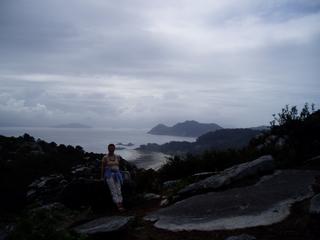We decided to leave anyway as it was only a short hop (30 miles) to the Isla Cies and most of the bad weather appeared to be in the north. As we cleared the river, rain passed over the mainland obscuring the port we'd left and another squall blocked out the islands we were aiming for. We donned full wet weather gear and prepared for the inevitable drenching, but were spared; rain only hit us after we'd dropped anchor and were safely below decks.FINISTERRE:
WESTERLY 3 TO 5 LOCALLY 6 TO 8 IN NORTH, VEERING NORTHWEST
4 TO 6 LATER.
SEVERE GUSTS. ROUGH OR VERY ROUGH. SQUALLS LOCALLY THUNDERY.

Exploring the Island
The following day was sunny and spent exploring the island and swimming.
We planned to spend sometime diving under Kika and cleaning any growth that had attached itself to the hull, but only managed a couple of dives before the cold overcame us - felt colder than the propeller cleaning dives in Dartmouth or perhaps we're loosing our north European acclimatisation to the cold.
We're progressing slowly in the galley with our first loaves of bread baked and consumed - the lack of any shops on the island and our inability to simultaneously buy food AND organise the laundry led to our supplies of fresh food being low and we had to raid our bread mix and canned foods.
We're now in Bayona which presented us with our first stern-to mooring challenge. We'd planned to pick up a mooring buoy, but were directed to a narrow gap between two yachts both moored stern-to on the pontoon. So far we’d managed to avoid this kind of mooring as I'm still becoming accustomed to manoeuvering Kika in confined spaces. Going astern doesn't appear to be her strongest ability - certainly with me at the helm. Still we managed to reverse in and stop before we bent the self-steering gear, despite conflicting instructions from Spanish on-lookers.
Bayona looks like a great place to explore so we’re planning to stay here a couple of days before heading to Portugal.



No comments:
Post a Comment